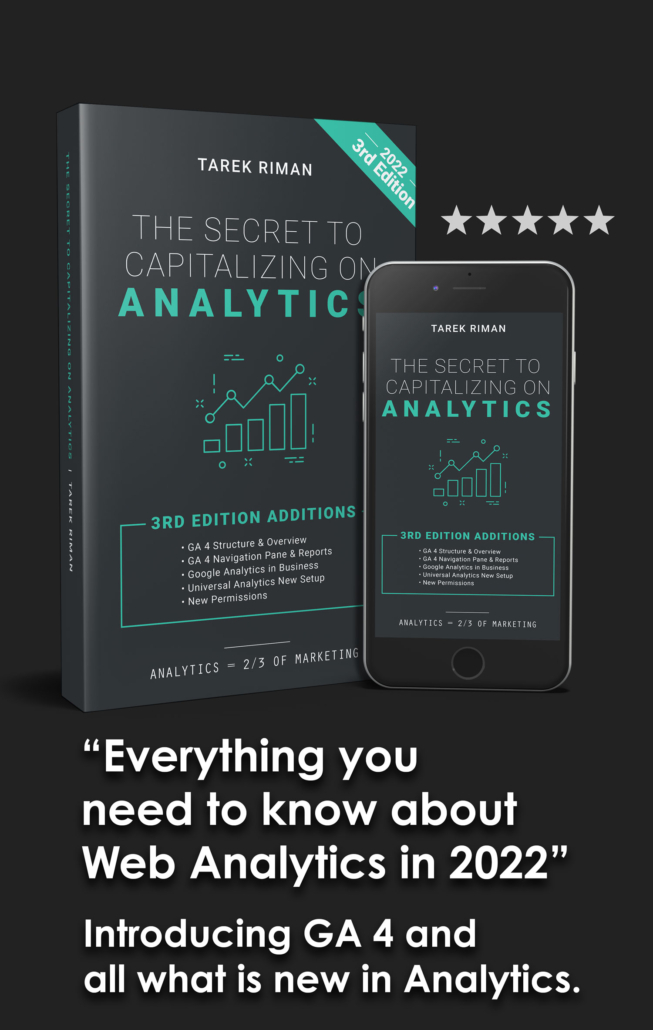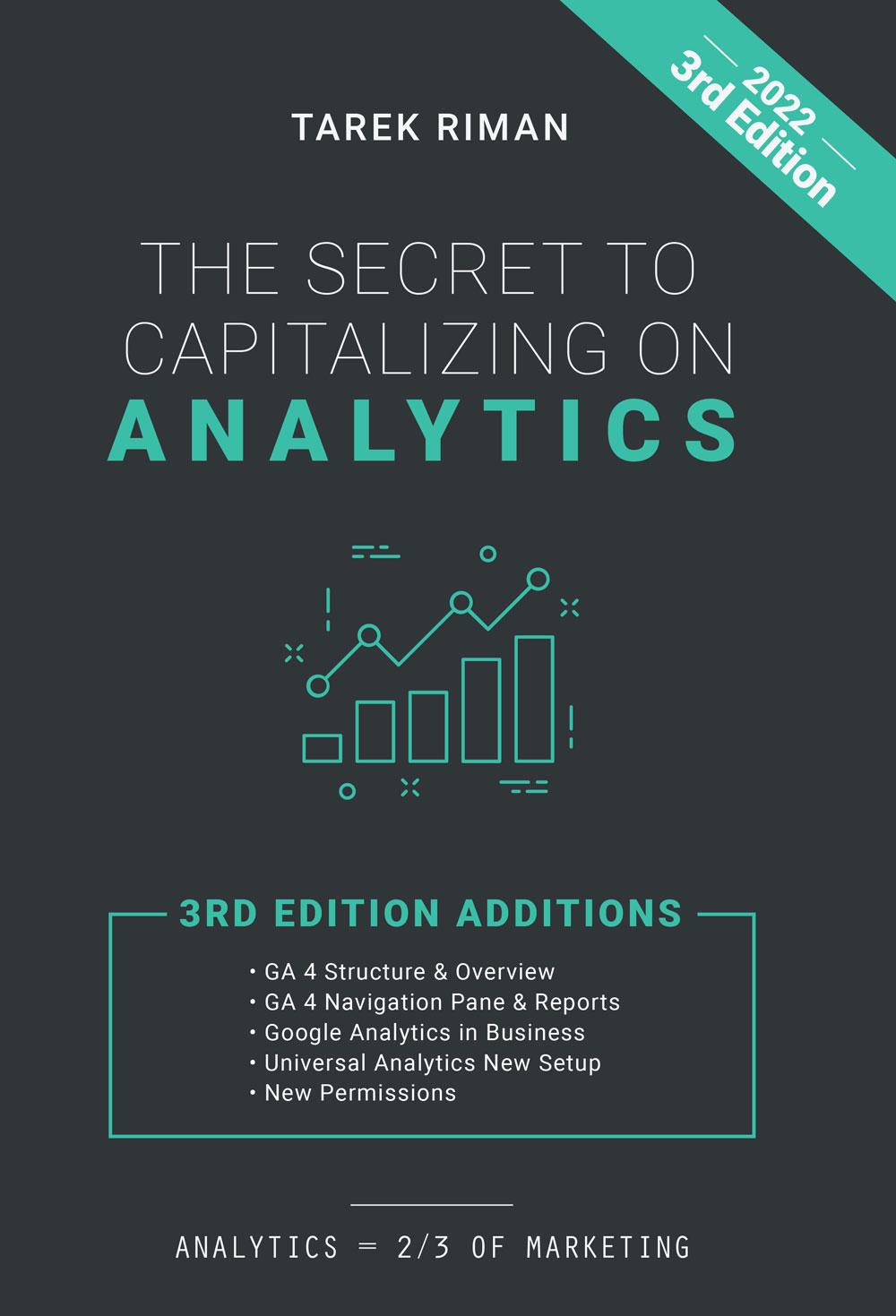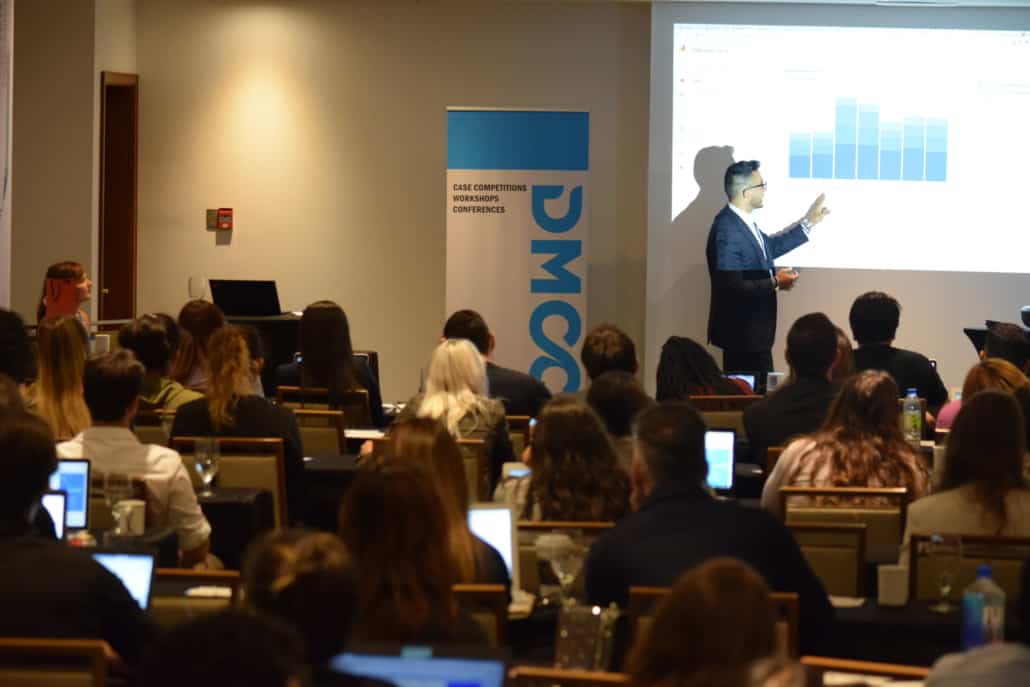The Secret To Capitalizing on Analytics
A Web Analytics Book for Beginners.
The Secret to Capitalizing on Analytics‘ purpose is to help start-ups, entrepreneurs, businesses, students, beginners and marketers understand how to use data to optimize and improve their business and marketing strategy.
All businesses today, no matter what their size, need to know how their website is performing.
Without analytics, there is no way for a company to know how their website is performing in terms of attracting, informing and converting visitors.
In this book, you will learn how to get started with Google Analytics and how to set it up for optimal tracking. You will also learn to assess which marketing campaigns bring the best traffic to your website, which pages on your website are the most popular and how to extract information about your visitors. Information such as location, interests, age, behaviours and more so you can better understand your web traffic and capitalize on your marketing. You will also learn how to capitalize on the different trends and tools that are available.
About the Author
 As a digital marketing expert, I’ve been fortunate to work with 350+ agencies, SMBs and Fortune 500s.
As a digital marketing expert, I’ve been fortunate to work with 350+ agencies, SMBs and Fortune 500s.
I teach at Concordia, McGill, York and other international universities.
I carry master’s and bachelor’s degrees and diplomas from Concordia University, Queens University, Berkely University, and Harvard.
I have written and published four best-selling books, ranging from my pilgrimage on the Camino de Santiago to analytics, SEO, and SEM.
My goal is to give clients, companies, businesses and students the tools they need to learn and use digital marketing in the best way possible.
I also founded Montrealtips.com, with proceeds going to the Breakfast Club of Canada, UN Refugee Agency, Montreal Children’s Hospital. I am also involved with NGOs & charities in Canada & worldwide.
As a speaker and workshop leader, I give talks on Digital Analytics, Social Media, SEO/SEM, Digital Marketing, WordPress, Content Marketing and my Journey on the Camino de Santiago.
I am certified in all the major platforms: AdWords, Analytics, Bing, HubSpot, Woorank, OMCP, Facebook & Hootsuite.
You can find my books here:
– The Camino Within: https://amzn.to/3mSDUAZ
– The Secret to Capitalizing on Analytics: https://amzn.to/3zlzXtr
– The SEO Way: https://amzn.to/3zkF3WO


Book Outline
The book starts with an introduction to analytics, data and digital marketing. Highlighting their importance in today’s market place.
We then dive into the mindset and the way of thinking that we should adopt to succeed as entrepreneurs, students, marketers and businesses.
The book then goes into the process of creation, optimization and assessment of data.
This book highlight all the important reports in Google Analytics and other trend measuring tools.
Finally, the book goes on how we can dashboard properly and how to use data to improve our SEO, SEM and Marketing strategy.
Part of the proceeds from this book will go out to support the following causes:
Part of the Proceeds & Copies of the book will be provided to:

FAQ of Analytics
Analytics – Questions to support the book
How can analytics help a company?
Even if all you have, in terms of a web presence, is a simple website with a bit of info and your store’s physical address, it’s a huge benefit to know if people are actually finding you through it!
Let’s say you have something more complex, like a full online store. And, let’s say you know it’s driving a lot of sales. Wouldn’t you like to know where your best customers are coming from? Which entry pages perform best? Where you’re losing people? When you have that insight, you can plug leaks, focus investments for the greatest impact, and capitalize on the areas that perform best.
Analytics gives you so much insight into the performance of your web properties and how visitors are interacting with them. It allows you to identify what’s working, what isn’t, and what you can capitalize on. It can do this on a very granular level that empowers you to really focus your resources and get the most bang for your buck. Here are just a few of the insights you can get from it:
- Know what sources are driving your best traffic, and which ones aren’t
- Identify your top performing, and underperforming, pages
- See what paths visitors are taking once they arrive on your site
- Know where you’re losing people
- Test different landing pages or page elements against each other
- Understand what keywords people use to search for you and your competitors
Are data and analytics important for small companies?
Yes. In the past, only the largest companies with the deepest pockets could get even close to the type of insight analytics provides today. Now, analytics tools are accessible to companies of any size, meaning you can drive Fortune 500 results without the Fortune 500 budget.
Why analytics is important for HR?
Probably the best use of tools like Google Analytics for HR is in recruitment. There is a great deal of marketing involved in attracting top talent. From understanding what search terms candidates are using in their job hunts, to how they respond to your job postings, analytics can provide a wealth of insight.
Additionally, because analytics can give so much insight into the performance of the company’s web properties, it can help you get a clear picture of exactly the type of hiring you need to do. For example, you may know that you need someone to help improve website performance, but do you need SEO work? Content creation? Advertising strategies? UI/UX help? Someone to address compatibility issues? Analytics can give you a clearer picture of the problem, so that you know who is best suited to fill the gap.
How do I get started with Analytics?
If using Google Analytics (which is currently the most flexible, user friendly tool on the market, and it’s free), there is a bit of a learning curve to get started, and some tips and tricks that will really help you get the most of it. But, once you’ve figured out the basics and practiced a little, you should very quickly be able drive real value.
The Secret to Capitalizing on Analytics will walk you through the setup process, step by step, and walk you through some of the more common uses and configurations to get you started on running reports, understanding the data, and customizing the tool to suit your specific business objectives.
How do I introduce data to my company?
Benefit is everything. When people understand why they need something and what they’re going to get out of it, it’s so much easier to introduce new technologies, processes and best practices.
Analytics is all about customization. So, consider the general benefits of analytics, then consider how those apply to your organization and what it will help you achieve. Then, consider how it will help your team do their jobs better. Finally, consider the technical abilities of your team and what support they will need in adopting analytics.
So, it may sound something like this: “Analytics will give us the insight into market trends to get a leg up on our competition, as well as the insight into our own website performance in order to capitalize on what’s working and fix what isn’t. You will be able to consult real time data and trends in order to make better and faster decisions in your own work.”
Depending on the current knowledge and skill set of your team(s) you may then follow up will a simple workshop, or some more extensive training to get everyone comfortable with the tool and able to use it to its fullest.
Would an analytics workshop benefit employees and professionals?
This really depends on the level of knowledge you currently have. If you’re all experts already, you probably don’t even need this book, let alone a workshop.
But, if you’re new to analytics, want to get a better grasp of the flexibility of the tool, or if you want to introduce different departments to using analytics in different ways, a workshop can be a huge benefit, especially one that can be customized to your specific needs and objectives. If you’re having trouble getting your team to fully grasp the benefits of analytics, a good workshop can help you overcome that hurdle as well.
Is learning analytics important for students and universities?
Yes. Analytics is business intelligence. It has applications in almost every industry and in a wide range of roles and specialties. Whether your students are studying accounting, veterinary sciences, international relations, law or even fine arts, arming them with a solid foundation of how analytics works and what it can do will give them a huge leg up in the job market or in their individual pursuits.
For universities themselves, analytics can also provide a great deal of insight into how their web properties are performing whether it’s from a recruiting perspective, alumni relations, fundraising, web tools for faculty and staff, or apps and tools for students.
Why should analytics be part of corporate training?
Business moves faster than ever these days. A daily report is great, an intern or assistant to pull up stats on the fly is great, but even better is being able to instantly pull up real time data, wherever you are. It’s also a huge benefit to know how to customize reports to your needs and filter out what isn’t relevant to you.
If you want to get the full benefit of analytics, figure out how it can be applied to the various levels and departments, then incorporate it into your standard corporate training so that everyone in your organization knows exactly how to get the insight they need to take their role and team to the next level. If you’re struggling with any part of this, an analytics consultant can help.
Books Sold
Optimized Websites & Web Properties
Certifications in Digital Marketing
Workshops Given
The Secret to Capitalizing on Analytics Workshops
Option 2 (Analytics) 9-hour workshop divided over 3 different days.
Day 1 (3.5 hours)
- The Future
- Understanding the role of Analytics and data in business.
- Understanding the future of business and analytics.
- The way of thinking for 2020
- Introduction to trends and tools.
- Developing an eye for trends.
- 30 min (Trends exercise)
- Intro to Google Analytics
Day 2 (3.5 hours)
- Setting up Google Analytics.
- Understanding Google Analytics structure.
- Understanding Google Tag Manager.
- Understanding all the important terms
- Audience reports.
- 30 min group exercise (Creating 5 personas based on data)
- Behaviour Reports
- Behaviour Analysis exercise.
Day 3 (3 hours)
- Conversion reports
- 15 minutes of class exercise (creating goals)
- Acquisition reports
- Understanding how Google Analytics works with other properties.
- Understand how Google Analytics works with Google search Console.
- Understand how Google Analytics works with Google AdWords.
- Trends and content
The Secret to Capitalizing on Analytics Workshops
Option 3 (Full Workshop)
Day 1 (3.5 hours)
- The Future
- Understanding the Role of Analytics and data in business.
- Understanding the future of business and analytics.
- The way of thinking for 2020
- Introduction to trends and tools.
- Developing an eye for trends.
- 30 min (Trends exercise)
- Intro to Google Analytics
Day 2 (3.5 hours)
- Setting up Google Analytics.
- Understanding Google Analytics structure.
- Understanding Google Tag Manager.
- Understanding all the important terms
- Audience reports.
- 30 min group exercise (Creating 5 personas based on data)
- Behaviour Reports
- Behaviour Analysis exercise.
Day 3 (3 hours)
- Conversion Reports
- 15 minutes of class group exercise (Creating Goals)
- Acquisition Reports – 15 min exercise (Source analysis and strategy)
- Understanding how Google Analytics works with other properties.
- Understand how Google Analytics Works with SEO.
- Understand how Google Analytics works with SEM.
Day 4 (3 hours)
- Review + Certification.
- Google Analytics Certification.



![logos-camino-within[1]](https://rimanagency.com/wp-content/uploads/2019/02/logos-camino-within1.jpg)



